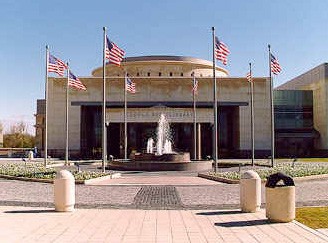
Bush library possibility spurs campus debate
The prospect of a George W. Bush presidential library has a lot of people on campus excited. At the same time, it has prompted an important discussion of educational and financial issues.
SMU faculty and staff said a presidential library would bring great resources and prestige to the school. But some professors are concerned that the money used to build and run it could take away funds for program development, salary increases and scholarship funding.
Jim Hopkins, chair of the history department, welcomes the prospect of the Bush library at SMU.
“It would be an extraordinary resource for researchers and a wonderful way to introduce thousands of people to the university each year,” he said.
Hopkins said the library would be very important to the history department because it will focus on the early 21st century.
At the same time, he sees some negative aspects in the project.
“There may be some danger that the resources that might go into salaries, scholarships and academic programs could instead be diverted to the presidential library,” he said.
Several universities, including Texas A&M, Baylor, the University of Texas at Austin and Yale University, are working on a proposal to attract the Bush presidential library.
According to Associate Provost Tom Tunks, whichever university wins the library will have to set up a foundation and raise as much as $200 million to pay for the construction of the library, a museum, an endowment and the costs needed to support the library.
Tom Barry, vice president for executive affairs, said that fundraising to finance the library and museum will be handled separately.
“Friends of Bush will give money for this institution to be created,” he said.
Barry said he is certain that Bush will take a personal role in creating the library, thus making it easier to raise money.
But Thomas Osang, a professor of economics, said that financing the library without neglecting academic programs could be complicated.
“Even though money for the library comes from external sources, there is only so much money that can be used for scholarships, endowed chairs and regular libraries,” he said.
Hopkins voiced similar concerns.
“Would people contributing to the library campaign pledge money for academic programs as well?” he said.
Tunks, who chairs the committee that will develop the Bush library’s academic programs, remains optimistic.
“Some people have been very good benefactors to SMU and won’t limit themselves to one time,” he said.
Dennis Cordell, a professor of history and associate dean for general education, worries that the Bush library would undermine existing programs.
“Even though a library could raise the profile of the university at a national level, we have to make sure that the resources invested in it do not result in the diminution of funds devoted to the programs already in place and intended for students and professors,” he said.
Politics also presents a potential problem. Many donors may give money for the library to show their support to a Republican president.
But other people do not want SMU to be associated with the current president, Osang said.
Tunks said politics is not an issue.
“Whether an individual is a Republican or Democrat is unimportant,” he said. “When a person is president, it’s not a matter of politics. It’s a matter of history.”
If President Bush chooses SMU as the home for his library, it will probably be built on the eastern side of the campus by Central Expressway along SMU Boulevard, Barry said, who is on the library coordinating committee.
An architectural firm was hired to study the various locations and determine the best site. Another possibility is the old site for Mrs. Baird’s Bakery, Hopkins said, but nothing has been decided yet.
Jasper Neel, dean of Dedman College and a member of the panel that will recommend the buildings for the library complex, said the library would be composed of two parts: a museum and library housing presidential papers open to the public and the George W. Bush school. The school would be housed in an adjacent building, probably attached to the library and the museum, Neel said. The school would have its own dean, administrative office, faculty members and staff.
Some professors believe that the school is a necessary part of the presidential library proposal. James Hollifield, a political science professor and the director of international studies, said that he welcomes the idea of a library, but insisted that “it would have to come with academic programs attached to it.”
He said that if the project is done correctly and a school of international and public affairs is built, it would add a new dimension to SMU.
Jimmy Tran, an economics, political science and public policy senior, agrees.
“A presidential library would have a positive effect on the academic reputation of the university and deepen our ties with the Bush’s family,” he said.
Neel said faculty members in law, history, economics, political science and business would hold adjunct appointments.
“These associate or full professors would maintain their primary appointment in their own school, but they would also have the possibility to teach in the Bush school,” Neel said.
That means some departments would be more involved in the Bush school than others. Because the departments of political science, economics and history are more directly related to the library, they would get to hire additional scholars, Osang said.
“Benefits produced by the Bush school would not be evenly distributed across the departments,” he said.
SMU officials believe the Bush library would serve as a magnet for students and dollars.
“With a presidential library, a lot of students will come to visit the library as tourists and we would recruit students that would not have thought of studying at SMU,” Neel said.








